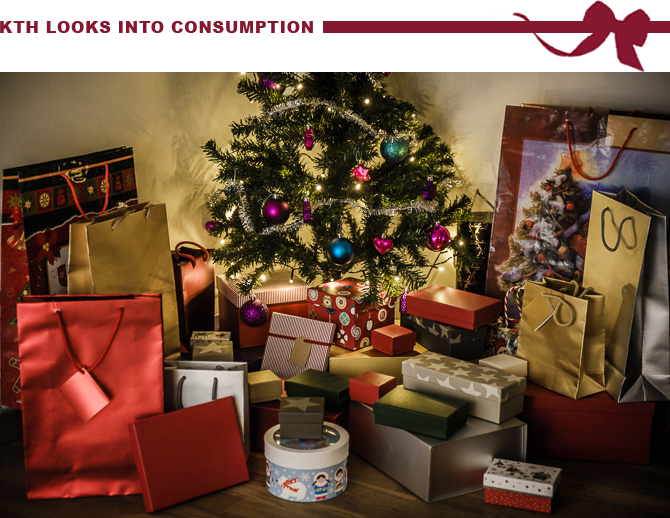
Being green without being a grinch
Sweden has reduced its own greenhouse gas emissions. Yet as the holiday gift-giving season approaches, gadgets produced in countries with different environmental standards gather under Christmas trees across the country.
“Measuring emissions for one’s own country does not give you the whole picture,” says Göran Finnveden, Professor of Strategic Environmental Analysis and Vice President for Sustainable Development at KTH. “It’s important to have an overall perspective so that we do not just move around emissions.”
Even though most countries agree that emissions must be radically reduced, perhaps by 50 percent or more by the middle of this century, global greenhouse gases continue to increase.
According to the Swedish Environmental Protection Agency's report on the impact of consumption, total emissions from Swedish consumption increased from 100 to 117 million tonnes between 1993 and 2011. During the same period, emissions in other countries increased by 30 million tonnes as a result of Sweden’s consumption.
“It's also a dilemma because increased trade can lift people out of poverty — so it is complex,” Finnveden says.
The shopping season can easily become too much — the marketing is intensive and the wish lists of children are near impossible to resist. While many want to do right from an environmental point of view, it is difficult to reconcile sustainability and consumption. So what can one do?
“Environmental issues are complex and intimately associated with many different areas of society,” Finnveden says. “But just as in the case of police or medical care, it’s not primarily a responsibility of the individual. It must also be solved at the societal level through various social solutions and measures."
"We all have an individual responsibility, as consumers, citizens and in our professional roles,” he says. “Most do the best they can, based on what they know and are familiar with. I think you can buy the Christmas tree you want.”
One policy measure is through taxation:
"If we have taxes on alcohol and tobacco, we can have it on emission-intensive products, too.”
But how should deal with the holidays?
“Maybe buy second hand gifts, or sustainable products, and invest in things that last a long time.”
Housing, construction and food production are the areas with the greatest emissions, alongside transport and industrial production. The largest source of greenhouse gas emissions is the burning of fossil fuels.
“Technology development is necessary, but not sufficient to tackle climate change. When it comes to long-term decisions on things like buildings and infrastructure, it's important to consider how they will fit in with a future sustainable society."
According to the overall climate research, the environmental situation is — as most are aware — quite serious. By the end of this century, the global temperature could rise by an additional 4 degrees, leading to:
- Collapse of entire ecosystems
- Collapse of food production in entire regions due to heat and drought
- Increased risk in the global financial system
- Risk of conflict over resources
- Water scarcity
- Extreme weather
“We can also expect surprises,”Finnveden says. “This is like a giant, large-scale experiment, in which no one knows what the outcome will be.”
But what good can I do? I feel like whatever I do is a drop in the ocean?
“Yes, but drops in the ocean are still drops. Each kilogram of carbon dioxide leads to increased heating.”
Sometimes it can feel as though whatever you do will be wrong environmentally.
“But it doesn’t help to be burdened by guilt. As individuals, people can also try to find synergies for themselves. Do things that are both good for the environment and for you — like walking or cycling and eating less meat.”
Anyway — what do you want for Christmas?
“Peace on Earth - is that good?”
Jill Klackenberg

